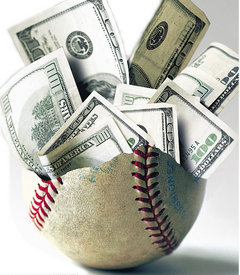Don't Buy the Tanking Arguments Whole Cloth
It’s the off-season again, and we are heading into the Major
League’s Winter Meetings. Not
surprisingly, there are rumblings of “tanking” being heard across the land, and
proposals on how to combat this evil. But
before falling for the arguments and the proposals, consider the true source of
the accusations. Are teams really
risking their box office draw by being bad?
Or is “tanking” just the latest ruse meant to benefit marginal players
reaching free agency years.
Free agency is a ticket many players see to greater wealth. A player spends a few years under the control
of their team. Then, once they have a
track record of being a consistent major league player, the door is open to
negotiate multi-million dollar contracts.
And of course the representatives of the players, the agents who
negotiate their contracts, like this arrangement, as they get a cut of their
employees’ pay. Financially, then, there
is an incentive among established players and their agents to keep pushing
contract prices higher and higher.
But free agency isn’t the only way, and may not always be the
best way, to build a competitive team.
Talent has to be replenished somehow.
So teams invest in young players and their development through the minor
league system. Young players’ salaries
are also less expensive.
So there is a tension within a team on whether to fill needs by
paying free agency prices for established players, or by using talent cultivated on the
farm system. Homegrown talent may be
cheaper, but without the necessary experience to perform at the top levels
immediately. Free agents may have
experience. But they can be expensive. Moreover, there is no guarantee that the
established player will continue to perform at peak levels.
Add to this tension the current rules concerning competition
and free agency. In an attempt to avoid
a situation such as that that plagued Philadelphia in the 1930s and 1940s
(after the last A’s world championship of 1930, both the Athletics and the
Phillies became perennial basement dwellers), competition rules give teams that
perform poorly an advantage in restocking the minor leagues with talent. Under the current rules, the advantage is
more than just a high pick in the amateur draft. Teams with poorer records are able to spend
more money signing the newly drafted amateurs and signing international talent. This is known as "pool money." This is what some argue creates the incentive
to “tank,” or field a less competitive team in the major leagues. A poorer record means a higher pick and more pool money to sign young talent.
But then there are the rules concerning free agency. If a player has been on one team for an
entire season at the end of his contract, the team has the option to tender a “qualifying
offer”; that is, an offer of a contract
for one more year of service at a minimum salary determined by the league. This year, the minimum salary was $17.2
million. If the player turns the offer
down, he may then become a free agent, and see if he can get a better salary
with a different team. However, if a new
team signs that players, that team forfeits a first round draft pick in the
amateur draft (unless the team has one of the top ten picks in the draft, which
are protected).
In the 2015-16 off-season, many experienced free agents who
turned down the qualified offer found themselves unsigned going into Spring
Training. In some respects, this was due
to the reluctance of teams to offer multi-million dollar deals to players who
were solid major leaguers, but not legitimate super stars. The reluctance was intensified by the fear of
losing a high level draft pick, and thus sacrificing the development of future
talent.
To put it simply, with the rules in effect last year, and the pool of talent available in free agency, there was
a greater incentive to stick with the cheaper home-grown talent than to sign a
marginal free agent.
And thus, in order to place pressure on teams to sign the free
agents, cries of “tanking” flew. Working
behind the scenes and influencing sportswriters, players’ agents could inflame
passions by accusing teams of purposefully being bad. These teams should not be permitted to
endanger the integrity of the regular season by fielding a team that would lose
on purpose to take advantage of the competition rules! And certain sportswriters bought this argument,
hook, line and sinker. Now the teams who
did not have talent ready to compete at the major league level, well it is not
due to any cycle of available talent.
These teams were being evil and gaming the system.
Of course it didn’t hurt that the collective bargaining
agreement runs out before the 2017 season.
Accusations of tanking could call attention to the free agency and
competition rules while the agreement is being re-negotiated. Of particular concern to the players’ union
is the system with the qualifying offer, as it creates an incentive not to sign
free agents.
So before jumping on the band wagon and accusing teams of “tanking,”
follow the money. Consider where the
allegations originated, and what their true purpose is. Are we really talking about people concerned
with whether or not San Diego ever wins a championship, or are we talking about
people who have a vested interest in inflating players’ salary to the point
where you, the fan, will dutifully plop down a weeks’ worth of your own pay to watch
millionaires play a game?
By: William J. Kovatch, Jr.



Comments
Post a Comment